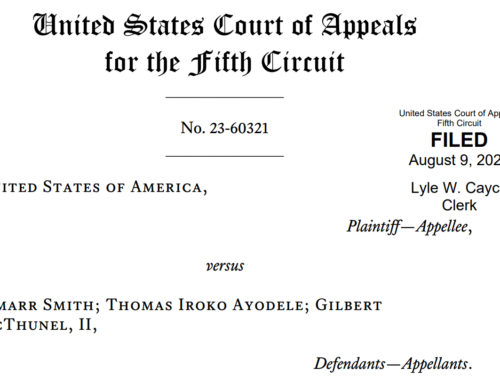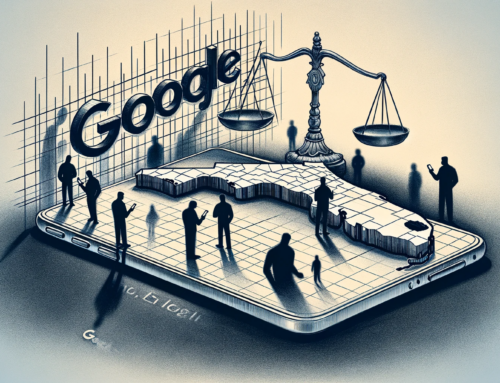Keyword Search Warrants: Unconstitutional Dragnets That Undermine Privacy and Free Speech
A little-known but increasingly common police investigative technique threatens all Google users’ privacy and free speech rights: the keyword search warrant. These warrants allow police to get identifying information on anyone who searched Google for specific terms—potentially sweeping up large numbers of innocent people in the process. The Electronic Frontier Foundation (EFF) and other organizations recently filed briefs to the Supreme Court of Pennsylvania in a case involving a keyword search warrant.
What Are Keyword Search Warrants?
Keyword search warrants are unlike typical search warrants that target specific people or accounts suspected of criminal activity. Instead, these digital dragnet warrants require Google to search its entire database of billions of users’ search queries within a certain timeframe and identify any accounts that searched for keywords chosen by police.
For example, if police are investigating a kidnapping or assault, they may ask Google to provide the identities of anyone who searched the victim’s name and address during the period around the crime. The idea is that the perpetrator may have used Google to look up the victim.
But keyword warrants are based on nothing more than speculation. Police have no evidence that the perpetrator, or anyone connected to the crime, performed such searches. These warrants simply rely on an officer’s hunch that the hypothetical records might provide evidence if they exist.
Keyword Warrants Undermine Privacy of Innocent People
Because keyword warrants search Google’s entire repository of search data, they potentially implicate large numbers of innocent users who just happen to have searched for something police think might be related to a crime.
And the information revealed goes far beyond just IP addresses. While Google may not immediately hand over full identifying details on users, the company does provide police enough information—IP addresses plus the actual search terms—for police to easily connect the dots and identify individuals. Police can get user identities by sending a subpoena to the internet service provider.
So these warrants effectively transform Google into an arm of law enforcement, conscripting the tech giant to conduct sweeping searches of user data for clues. All without evidence that Google has information relevant to an identified perpetrator.
The Risks to Free Speech
Beyond the privacy concerns, keyword warrants also threaten free speech. Search queries represent pure expressive activity—the words users type into the search box. Given Google’s dominance as a platform for finding and accessing information online, search queries also facilitate the rights to distribute and receive information protected under the First Amendment.
If users know police can easily access their search history tied to their real-world identity, it may deter them from seeking out controversial ideas or sensitive information on private topics like health, sexuality, politics, or other protected rights. Hence these warrants undermine intellectual freedom and reasoned public debate—core functions of free expression.
General Warrants by Another Name
EFF argues that keyword warrants are essentially 21st-century versions of “general warrants”—broad authorizations for police to search wherever they please that were anathema to the Founders. General warrants were a driving force behind the American Revolution and led directly to the adoption of the Fourth Amendment and corollary state constitutional provisions.
Indeed, keyword warrants bear striking resemblance to practices like “writs of assistance”—blanket search permissions used by British agents that specified no particular people or places to be searched. Similarly, keyword warrants are entirely open-ended as to whose data will be swept up—the decision over which people to pursue is left wholly to the discretion of the police.
Another Troubling Precedent: Geofence Warrants
Keyword warrants mirror “geofence warrants,” another novel digital policing method that is gaining popularity despite being highly questionable on constitutional and ethical grounds. Geofence warrants also employ a dragnet approach, allowing police to identify anyone whose cell phone happened to be near crime scenes based on location data harvested from apps.
Last year, Google reported that geofence warrants now comprise nearly 25% of all warrants the company receives from U.S. police. So while keyword warrants may seem obscure, they could be on a similar trajectory in terms of growth.
Court Precedent Suggests Keyword Warrants Are Unconstitutional
No appellate state supreme court has yet ruled on the validity of keyword warrants, but EFF argues that U.S. Supreme Court precedent suggests these warrants should be unconstitutional, violating both the Fourth Amendment and state constitutional search and seizure provisions.
Specifically, EFF and allies claim keyword warrants fall short of specificity requirements under particularity clauses that limit warrants to identified people, places, and items to be searched and seized based on demonstrated probable cause. Keyword warrants also violate a reasonable expectation of privacy given the vast amounts of identifying, private information they expose.
EFF points to the Supreme Court’s decisions in Carpenter v. United States and Riley v. California, recognizing privacy rights in sensitive digital data like cell phone location information and search histories. Though this data is maintained by third-party tech companies like Google and AT&T, Americans expect it will not be easily accessible without particularized judicial authorization.
Yet keyword warrants are the very antithesis of particularized—they authorize accessing huge troves of data without any individual suspicion. And private terms of service supposedly allowing Google to access user information do not nullify constitutional protections against unwarranted government intrusion.
Ominous Implications for Privacy Rights
In its argument, the EFF invokes the chilling implications of government efforts to discover people’s reading habits—whether in physical places like bookstores or the modern-day equivalent, search engines.
Just as customer book purchase records held by Amazon or browsing history at the local library would reveal protected intellectual activities warranting privacy, so too do Internet search queries containing the seeds of curiosity and exploration. If left unrestrained, keyword warrants could too easily cast damaging aspersions about users’ interests, opinions, and beliefs.
Google Continues Handing Data Over to Police
So far, U.S. technology companies have done little to resist overbearing demands from American police for user data, according to criticism by digital rights groups. For example, Apple made waves earlier this year by protecting customers’ encrypted data against FBI pressure. Yet Google continues playing ball with keyword warrants—despite fighting a similar warrant in Brazil.
The Pennsylvania Supreme Court now has a critical chance to rein in this novel breed of digital surveillance. Americans deserve and expect robust privacy rights and expressive freedoms online, so let’s hope the court follows EFF’s persuasive analysis. Constitutional rules should not bend simply because communication methods change. Otherwise, privacy and speech will suffer a slow death by a thousand cuts in the digital age.
Contact an Experienced Criminal Defense Attorney
If you or a loved one is dealing with criminal charges stemming from a questionable search warrant, you need someone on your side. We have extensive experience defending clients against unconstitutional searches. We understand the nuances of emerging digital surveillance techniques that many lawyers fail to grasp. Contact us for experienced legal representation protecting your constitutional rights in this high-stakes battle.
CALL US NOW for a CONFIDENTIAL INITIAL CONSULTATION at (305) 538-4545, or take a moment to fill out our confidential and secure intake form.* The additional details you provide will greatly assist us in responding to your inquiry.
THERE ARE THOUSANDS OF LAW FIRMS AND ATTORNEYS IN SOUTH FLORIDA. ALWAYS INVESTIGATE A LAWYER’S QUALIFICATIONS AND EXPERIENCE BEFORE MAKING A DECISION ON HIRING A CRIMINAL DEFENSE ATTORNEY ATTORNEY FOR YOUR MIAMI-DADE COUNTY CASE









